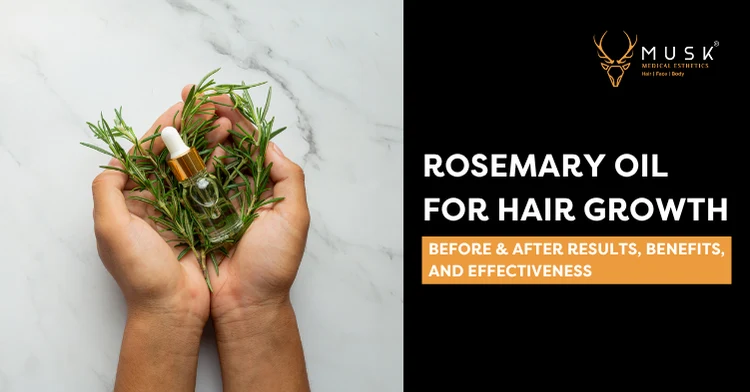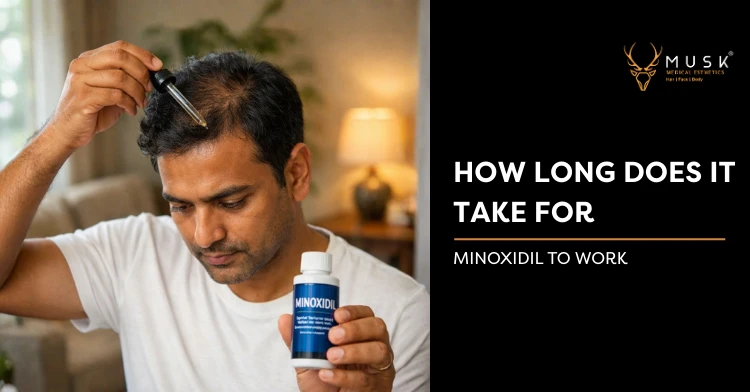Rosemary Oil for Hair Growth: Before & After Results, Benefits, and Effectiveness

Introduction: The Natural Hair Growth Solution
Hair loss and thinning can impact confidence, self-image, and even well-being for both men and women. Today’s professionals and image-conscious individuals are searching for gentle, yet effective solutions that fit modern lifestyles. At Musk Clinic—Ahmedabad’s leading center for hair restoration and aesthetics—we’ve seen a growing curiosity about natural, science-backed options that bridge ancient wisdom and clinical practice.
One ingredient is taking center stage: rosemary oil for hair growth. Used for centuries in Mediterranean wellness rituals, rosemary is now gaining modern traction for its impressive ability to support scalp health and boost natural regrowth. In this detailed guide, you’ll discover how rosemary oil works, real before and after results, safety tips, DIY usage, and how it stacks up against medical options like Minoxidil. We’ll also show you when to rely on natural remedies—and when expert help at Musk Clinic may make all the difference for your hair goals.
What is Rosemary Oil?
Botanical Origin and Essential Properties
Rosemary (Rosmarinus officinalis) is a woody, evergreen herb native to the Mediterranean. Its aromatic leaves produce a potent essential oil, renowned for powerful antioxidants and anti-inflammatory compounds. Steam distillation is used to extract this highly concentrated oil, preserving the active compounds—such as rosmarinic acid, cineole, and camphor—that are believed to offer unique benefits for both scalp and hair.
Why Rosemary Oil is Trending for Hair Growth
The buzz around rosemary oil isn’t just hype. A rise in interest in natural, non-invasive solutions is driven by positive user testimonials and highlights from clinical research. Social platforms are filled with before-and-after photos, and global publications cite promising clinical trials where rosemary oil rivals pharmaceutical treatments for hair loss. As more people seek alternatives to chemicals and synthetic drugs, rosemary oil’s holistic appeal is undeniable.
The Science Behind Rosemary Oil for Hair Growth
How Does Rosemary Oil Stimulate Hair Follicles?
Rosemary oil works through several scientifically backed mechanisms:
- Improved scalp circulation: By dilating blood vessels and promoting microcapillary perfusion, rosemary oil enhances blood flow to hair follicles, bringing vital nutrients and oxygen to the scalp.
- Antioxidant action: Compounds in rosemary protect follicles from free radical damage, helping prolong the hair growth cycle.
- Anti-inflammatory and antimicrobial effects: These properties soothe irritated scalps, reduce dandruff, and create an optimal growth environment.
- DHT blocking: Early evidence suggests rosemary oil may help block dihydrotestosterone (DHT), a hormone linked to genetic pattern hair loss.
Active Compounds in Rosemary Oil
- Rosmarinic acid: Potent antioxidant, reduces scalp inflammation.
- Cineole (Eucalyptol): Stimulates blood flow, enhances absorption.
- Camphor: Acts as a vasodilator, encouraging circulation.
- Alpha-pinene & bornyl acetate: Support antimicrobial and soothing action.
Clinical Studies and Research Findings
- 2015 randomized trial: 100 patients with androgenetic alopecia compared rosemary oil to 2% minoxidil. Both groups experienced significant hair count improvement over 6 months, with no significant difference between them. Rosemary oil causes less scalp itching, a common side effect of minoxidil.
- Recent animal studies: Mice treated with 1% rosemary oil solution saw greater hair quality, length, and density than those on minoxidil.
- Other human studies (2022-2025): Multiple reviews and trials confirm that rosemary oil’s effect on vascularity and antioxidant support translates to real hair growth benefits—especially for pattern hair loss (androgenetic alopecia).
“Researchers found rosemary oil to be as effective at encouraging hair regrowth as minoxidil, a medication better known as Rogaine®.”
Proven Benefits of Rosemary Oil for Hair
Rosemary oil is more than a folk remedy. Evidence and user results show its impact on:
- Increasing blood and nutrient delivery to scalp and follicles.
- DHT blocking effects, reducing pattern baldness progression.
- Stimulating dormant hair follicles for regrowth.
- Strengthening hair strands to reduce thinning and breakage.
- Calming scalp irritation and reducing dandruff, thanks to anti-inflammatory and antimicrobial properties.
- Boosting overall hair appearance—many reports shinier, thicker, healthier locks after 3–6 months of regular use.
Rosemary Oil vs. Minoxidil: Which Works Better?
Comparative Study Results
| Feature | Rosemary Oil | Minoxidil |
|---|---|---|
| Clinical Efficacy | Comparable to 2% minoxidil after 6 months for androgenetic alopecia | Widely studied, FDA-approved for hair loss |
| Mode of Action | Natural DHT blocker, enhances circulation, anti-inflammatory | Promotes scalp circulation; not a DHT blocker |
| Side Effects | Mild scalp irritation (rare), less frequent than minoxidil | Itching, scalp dryness, rare cardiovascular effects |
| Timeline of Visible Results | 3–6 months consistent use for improvement | 3–6 months typical, some respond sooner |
| Availability | OTC, natural health, DIY blends | Prescription/OTC formulations |
Side Effects Comparison
Rosemary oil: Lower incidence of scalp itching or irritation; recommended to always dilute in a carrier oil.
Minoxidil: More reports of dryness, scaling, and persistent scalp itching.
Both: Require consistent use for 3–6 months to see maximal results.
In a 2015 clinical trial, both treatments resulted in significant hair growth, but rosemary oil was less likely to cause scalp discomfort.
How to Use Rosemary Oil for Maximum Results
DIY Rosemary Oil Hair Treatment Recipe
Ingredients:
- 5 drops rosemary essential oil
- 1–2 tablespoons carrier oil (coconut, jojoba, or almond)
- Optional: 2 drops of peppermint or tea tree oil for enhanced effect
Application Methods and Techniques
1. Scalp Massage:
- Mix rosemary oil with a carrier.
- Gently massage into clean scalp with fingertips for 3–5 minutes to activate blood flow.
- Leave on for at least 30 minutes, or overnight if preferred.
2. Product Blending:
- Add up to five drops of rosemary oil per ounce of shampoo, conditioner, or hair mask.
3. Overnight Oil Treatment:
- Apply and cover hair with a shower cap. Rinse out in the morning.
Frequency of Use Guidelines
- Start 2–3 times a week. Once tolerance and comfort are established, increase frequency if desired.
- For best results: Use for at least 3–6 months in a consistent hair oiling routine.
Best Practices for Application
- Always dilute rosemary oil with a carrier to prevent irritation.
- Perform a patch test before full scalp application.
- Avoid direct contact with eyes and mucous membranes.
Consistent application (2–3 times per week) is key, and visible changes typically appear from the third month onward.
Who Should Use Rosemary Oil?
Best Candidates for Rosemary Oil Treatment
- Men and women with mild to moderate hair thinning or patchy loss.
- Anyone seeking a natural approach before exploring medical interventions.
- Ideal for androgenetic alopecia (male/female pattern baldness).
Hair Loss Types That Respond Well
- Androgenetic alopecia
- Telogen effluvium (often related to stress or hormones)
- Reactive hair loss after medical events
Age and Gender Considerations
- Safe for adults of all ages when used topically.
- Use with caution in pregnant individuals and children; always consult a healthcare professional first.
Potential Side Effects and Safety Considerations
Common Side Effects
- Mild scalp redness, irritation, or itching—usually linked to undiluted use.
- Oily or greasy hair if overapplied or not rinsed.
Allergic Reactions to Watch For
- Swelling, rash, or burning sensation.
- Patch tests diluted blend on inner arm and wait 24 hours before full use.
Who Should Avoid Rosemary Oil
- Individuals with allergies to rosemary or related plants.
- Those with epilepsy, seizure disorders, or chronic high blood pressure, unless cleared by a physician.
- Pregnant or breastfeeding women should consult healthcare providers before use.
Patch Test Instructions
- Dilute rosemary oil in carrier oil (1:10).
- Apply a small amount to the inner forearm.
- Wait 24 hours and monitor for irritation.
Maximizing Results: Tips from Hair Experts
Professional Application Techniques
- Consider micro-needling or scalp massage tools to help oil penetration—techniques available at Musk Clinic as part of holistic hair therapy.
Combining with Other Hair Growth Treatments
- Integrate rosemary oil with PRP therapy, Hair Booster, or Musk Exo Hair for potential synergy—especially when seeking medical-grade results.
- Avoid using multiple potent topical treatments at once (like minoxidil and essential oils) unless supervised by a specialist.
Lifestyle Factors That Enhance Effectiveness
- Eat a diet rich in protein, healthy fats, zinc, and iron.
- Manage stress, as chronic tension can trigger further hair loss.
- Practice regular gentle scalp massage and mindfulness rituals.
When to Consider Professional Hair Treatments
Limitations of Rosemary Oil
While rosemary oil offers real benefits, it may not reverse advanced or genetic hair loss. Large areas of baldness or long-standing thinning may require clinical evaluation.
Advanced Hair Loss Solutions at Musk Clinic
- PRP Treatment: Platelet-rich plasma therapy for stimulating dormant follicles.
- Hair Transplantation: ARTAS 9X Robotic, FUE/FUT, or body hair transplants for permanent regrowth.
- Low Level Laser Therapy (LLLT): Clinically proven light therapy for improving scalp circulation.
- Hair Revival Drip (IV therapy): Supplements scalp health from within.
Consulting a Hair Specialist
A personalized diagnosis at Musk Clinic determines underlying causes and the right course—whether natural, medical, or surgical. Book a detailed consultation for your unique needs.
Conclusion: Is Rosemary Oil Worth Trying?
Rosemary oil is a promising, evidence-backed natural remedy for those in the early stages of hair thinning or seeking to support overall scalp health. With benefits documented in clinical trials, and relatively low side effect risks, it’s a smart addition for anyone seeking a non-pharmaceutical approach—especially before more advanced interventions become necessary. As with all remedies, consistency is crucial, and partnering with qualified experts (like those at Musk Clinic) helps maximize your results.
Ready to transform your hair? Explore Musk Clinic’s integrated approach to regrowth or contact us today to personalize your journey to healthy, confident hair.
Frequently Asked Questions

Dr. Anand B. Shah
- 10 Years of Experience
Dr Anand B. Shah, is a board-certified Maxillofacial & Craniofacial surgeon who is highly skilled in cosmetic facial and hair restoration surgery and has exclusively practised the same, internationally and nationally.











